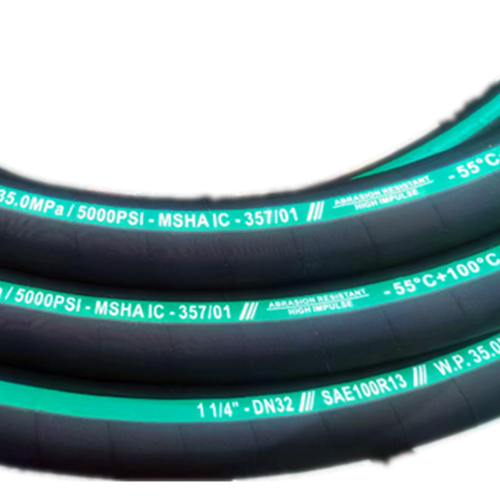335345435
Nov . 11, 2024 00:30 Back to list
Top Manufacturers of 100R16 Hydraulic Hoses in the Industry Today
Understanding 100R16 Hydraulic Hose Manufacturers
Hydraulic hoses play a crucial role in fluid power transmission systems across various industries. Among the numerous types of hydraulic hoses available, the 100R16 standard is particularly significant due to its durability and versatility. Manufacturers of 100R16 hydraulic hoses need to meet specific criteria to ensure their products can withstand high-pressure environments and perform consistently. This article explores the characteristics of 100R16 hydraulic hoses, the importance of choosing the right manufacturer, and key features to consider.
What is 100R16 Hydraulic Hose?
The 100R16 standard is defined by the Society of Automotive Engineers (SAE) and specifies the construction, materials, and performance characteristics of hydraulic hoses. This type of hose is designed for high-pressure applications, making it ideal for use in hydraulic systems within construction, agriculture, mining, and industrial machinery.
A 100R16 hose is reinforced with one or more layers of high-tensile wire to provide strength and flexibility. Typically, these hoses have a rubber outer cover that offers protection against environmental factors such as abrasion, oil, and extreme temperatures. The versatility of the 100R16 standard allows these hoses to perform effectively under various pressures, often exceeding 4,000 psi, depending on the hose diameter and construction.
Importance of Choosing the Right Manufacturer
When selecting a hydraulic hose manufacturer, it is essential to consider a few critical factors. The quality of the hose directly affects performance, safety, and longevity. Here are some reasons why choosing a reputable 100R16 hydraulic hose manufacturer is important
1. Quality Assurance A reliable manufacturer adheres to industry standards and conducts rigorous testing to ensure that their products meet or exceed the specifications set by organizations like SAE. Look for manufacturers who offer certifications and quality assurances.
2. Material Selection The type of materials used in manufacturing can significantly impact the performance of hydraulic hoses. Leading manufacturers use premium-grade elastomers and steel wire to enhance durability and flexibility.
3. Experience and Expertise Manufacturers with years of experience in the industry typically understand the needs of different applications and environments. They can offer guidance and recommendations tailored to specific requirements.
4. Customer Support Good manufacturers provide excellent customer service and support. They should be able to assist you in selecting the right hose for your needs and offer after-sales support and maintenance guidance.
100r16 hydraulic hose manufacturers

5. Customization Some projects require hoses with unique specifications. The best manufacturers can provide customized solutions, ensuring that the hoses fit seamlessly into your hydraulic systems.
Key Features to Consider
When evaluating 100R16 hydraulic hose manufacturers, consider the following features to ensure you are making an informed decision
- Pressure Ratings Verify the maximum operating pressure ratings of the hoses offered by the manufacturer. This is crucial for ensuring safety during operation.
- Temperature Resistance Hoses must be able to withstand various temperatures, depending on the application. Assess the manufacturer's range of temperature-resilient hoses.
- Abrasion Resistance For hoses used in harsh environments, check for features that enhance resistance to wear and tear, such as additional protective covers.
- Compatibility with Fluids Ensure that the hoses are compatible with the fluids typically used in your hydraulic systems. Some materials may degrade over time when exposed to specific fluids.
- Lead Times and Availability Consider the manufacturer’s lead times and whether they have the capacity to handle your order quantity promptly.
Conclusion
The choice of a 100R16 hydraulic hose manufacturer is critical for the efficiency and safety of hydraulic systems. With the right manufacturer, businesses can ensure they receive high-quality hoses that meet industry standards for performance and reliability. By paying attention to quality assurance, material selection, and customer support, companies can mitigate risks associated with hydraulic failures, ultimately leading to smoother operations and reduced downtime. As the industry evolves, staying informed about the latest advancements in hose technology is essential for selecting the best hydraulic solutions available.
-
SAE 100 R17 Black Smooth Cover Hydraulic Hose
NewsMar.07,2025
-
SAE 100 R17 Black Smooth Cover Hydraulic Hose
NewsMar.07,2025
-
SAE 100 R17 Black Smooth Cover Hydraulic Hose
NewsMar.07,2025
-
SAE 100 R17 Black Smooth Cover Hydraulic Hose
NewsMar.07,2025
-
SAE 100 R17 Black Smooth Cover Hydraulic Hose
NewsMar.07,2025
-
steel wire braided hydraulic hose
NewsMar.07,2025



